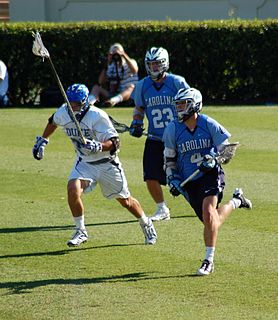
A dandy, historically, is a man who places particular importance upon physical appearance, refined language, and leisurely hobbies, pursued with the appearance of nonchalance in a cult of self. A dandy could be a self-made man who strove to imitate an aristocratic lifestyle despite coming from a middle-class background, especially in late 18th- and early 19th-century Britain.
Grok is a neologism coined by American writer Robert A. Heinlein for his 1961 science fiction novel Stranger in a Strange Land. While the Oxford English Dictionary summarizes the meaning of grok as "to understand intuitively or by empathy, to establish rapport with" and "to empathize or communicate sympathetically (with); also, to experience enjoyment", Heinlein's concept is far more nuanced, with critic Istvan Csicsery-Ronay Jr. observing that "the book's major theme can be seen as an extended definition of the term". The concept of grok garnered significant critical scrutiny in the years after the book's initial publication. The term and aspects of the underlying concept have become part of communities as diverse as polyamory and computer science.
A retronym is a newer name for an existing thing that differentiates the original form or version from a more recent one. It is thus a word created to differentiate between two types, whereas previously no clarification was required.
A neologism is a relatively recent or isolated term, word, or phrase that may be in the process of entering common use, but that has not yet been fully accepted into mainstream language. Neologisms are often driven by changes in culture and technology, and may be directly attributable to a specific person, publication, period, or event. In the process of language formation, neologisms are more mature than protologisms.
"Yuppie" is a term coined in the early 1980s for a young professional person working in a city.
Dude is American English slang for an individual, typically male. From the 1870s to the 1960s, dude primarily meant a person who dressed in an extremely fashionable manner or a conspicuous citified person who was visiting a rural location, a "city slicker". In the 1960s, dude evolved to mean any male person, a meaning that slipped into mainstream American slang in the 1970s. Current slang retains at least some use of all three of these common meanings.
As a result of the increasing popularity and dominance of the Google search engine, usage of the transitive verb to google grew ubiquitously. The neologism commonly refers to searching for information on the World Wide Web, regardless of which search engine is used. The American Dialect Society chose it as the "most useful word of 2002." It was added to the Oxford English Dictionary on June 15, 2006, and to the eleventh edition of the Merriam-Webster Collegiate Dictionary in July 2006.

Bogan is Australian and New Zealand slang for a person whose speech, clothing, attitude and behaviour are considered unrefined or unsophisticated. Depending on the context, the term can be pejorative or self-deprecating. The prevalence of the term bogan has also been associated with changing social attitudes towards social class in Australia. Specifically, the term has been related to the decline of masculine conceptions of meritocracy in Australia, and a growing ambivalence towards traditional sites of working class culture.
"Chav" is a pejorative epithet used in the United Kingdom to describe a particular stereotype of anti-social youth dressed in sportswear. The word was popularised in the 2000s by the British mass media to refer to an anti-social youth subculture in the UK. The Oxford English Dictionary defines "chav" as an informal British derogatory, meaning "a young lower-class person who displays brash and loutish behaviour and wears real or imitation designer clothes". The derivative chavette has been used to refer to females, and the adjectives chavvy, chavvish and chavtastic have been used in relation to items designed for or suitable for use by chavs.
Grebo was a short-lived subgenre of alternative rock that incorporated influences from punk rock, electronic dance music, hip hop and psychedelia. The scene occupied the period in the late 1980s and early 1990s in the United Kingdom before the popularisation of Britpop and grunge.
Lad culture is a British subculture initially associated with the Britpop movement. Arising in the early 1990s, the image of the "lad"—or "new lad"—was that of a generally middle class figure espousing attitudes typically attributed to the working classes. The subculture involves young men assuming an anti-intellectual position, shunning sensitivity in favour of drinking, violence, and sexism.

Hotpants, hot pants, or booty shorts describe extremely short shorts, which may be worn by women or to a lesser extent, by men. The term was first used by Women's Wear Daily in 1970 to describe shorts made in luxury fabrics such as velvet and satin for fashionable wear, rather than their more practical equivalents that had been worn for sports or leisure since the 1930s. The term has since become a generic term for any pair of extremely short shorts. While hotpants were briefly a very popular element of mainstream fashion in the early 1970s, by the mid-1970s, they had become associated with the sex industry, which contributed to their fall from fashion. However, hotpants continue to be popular as clubwear well into the 2010s and are often worn within the entertainment industry, particularly as part of cheerleader costumes or for dancers. Performers such as Britney Spears and Kylie Minogue have famously worn hotpants as part of their public performances and presentation.
A compound modifier is a compound of two or more attributive words: that is, two or more words that collectively modify a noun. Compound modifiers are grammatically equivalent to single-word modifiers, and can be used in combination with other modifiers.
In the United States and Canada, a jock is a stereotype of an athlete, or someone who is primarily interested in sports and sports culture, and does not take much interest in intellectual culture. It is generally attributed mostly to high school and college male athletics participants who form a distinct youth subculture. As a blanket term, jock can be considered synonymous with athlete. Jocks are usually presented as practitioners of team sports such as football, lacrosse, basketball, baseball, soccer and hockey.
Protologism is a term invented in the early 2000s by Mikhail Epstein, an American literary theorist, to refer to a new word which has not gained wide acceptance in the language. A protologism becomes a neologism as soon as it appears in published press, on a website or book independent from the coiner.
A portmanteau or portmanteau word is a linguistic blend of words, in which parts of multiple words or their phones (sounds) are combined into a new word, as in smog, coined by blending smoke and fog, or motel, from motor and hotel. In linguistics, a portmanteau is defined as a single morph that represents two or more morphemes.
In popular culture, the Bro Code is a friendship etiquette to be followed among men or, more specifically, among members of the bro subculture. The term has been popularized by Barney Stinson, a character from the television show How I Met Your Mother. Katherine Connor Martin, head of content creation at Oxford Dictionaries, recognized Stinson as "the quintessence of a certain iteration of the contemporary bro".

"Airhead", also known as "Trixie", "basic bitch", or simply "basic", is a slang term in American popular culture used to pejoratively describe middle class white women who are perceived to predominantly like mainstream products, trends, or music. "Airhead" dates back to the late 1980s as a derogatory term for a stupid or unaware person, usually female but sometimes male. "Basic bitch" originated in hip-hop culture and rose in popularity through rap music, songs, blogs, and videos from 2011 to 2014.

Manspreading or man-sitting is the practice of men sitting in public transport with legs wide apart, thereby covering more than one seat. Both this posture and the use of the neologism "manspreading" have occasioned some internet criticism and debates in the US, UK, Turkey, and Canada. The public debate began when an anti-manspreading campaign started on the social media website Tumblr in 2013; the term appeared a year later. OxfordDictionaries.com added the word "manspreading" in August 2015. Use of the term has been criticized as "a caricature of feminism" and the practice has been juxtaposed with examples of women taking up excessive space in public spaces with bags.














